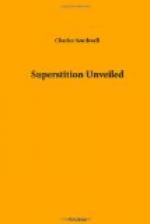I possess little faith in political fanaticism, especially when in alliance with the frightful doctrines enunciated from conventicle pulpits, and have no hesitation in saying that Anti-State Church Associations do not touch the root of political evils. Their usefulness is great, because they give currency to a sound principle, but that principle though important, is not all-important—though powerful, is not all-powerful. If universally adopted, it is questionable that any useful change of a lasting character would be worked in the economy of politics.
Wise men put no trust in doctrine which involves or assumes supernatural existence. Believing that supernaturalism reduced to ‘system’ cannot be other than ‘wickedly political,’ they see no hope for ‘slave classes,’ apart from a general diffusion of anti-superstitious ideas. They cannot reconcile the wisdom of theologians with undoubted facts, and though willing to admit that some ‘modes of faith’ are less absurd than others, are convinced they are all essentially alike, because all fundamentally erroneous.
Speculative thinkers of so radical a temper are not numerous. If esteemed, as happens to certain commodities, in proportion to their scarcity they would enjoy a large share of public respect. Indeed, they are so few and far between, or at least so seldom make their presence visible, that William Gillespie is convinced they are an anomalous species of animal produced by our common parent ’in a moment of madness.’ Other grave Christian writers, though horrified at Universal—nicknamed Athe-ism—though persuaded its professors, ’of all earth’s madmen, most deserve a chain;’ and, though constantly abusing them, are still unable to believe in the reality of such persons. These, among all the opponents of Sense and Wisdom may fairly claim to be considered most mysterious; for, while lavishing on deniers of their idols every kind of sharp invective and opprobrious epithet, they cannot assure themselves the ‘monsters’ did, or do, actually exist. With characteristic humour David Hume observed, ’There are not a greater number of philosophical reasonings displayed upon any subject than those which prove the existence of Deity, and refute the fallacies of Atheists, and yet the most religious philosophers still dispute whether any man can be so blinded as to be a speculative Atheist;’ ’how (continues he) shall we reconcile these contradictions? The Knight-errants who wandered about to clear the world of dragons and of giants, never entertained the least doubt with regard to the existence of these monsters.’ [8:1]




